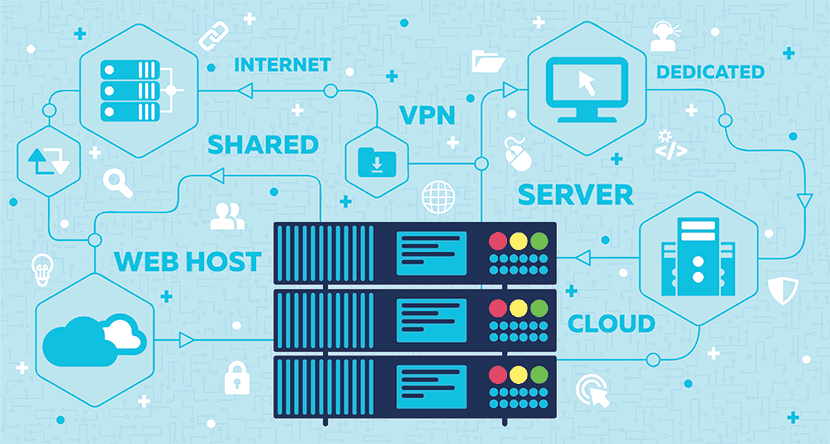Your hosting provider plays a central role in the distribution of your online content. Without a reliable web hosting service, your ability to reach your audience online is impacted.
The host that you end up with must scale and adapt to your business needs.
Your decision will come down to one of two choices: Virtual Private Server (VPS) or a Dedicated Server. It’s critical to understand the differences so that your business has the hardware solution for your needs.

VPS Hosting Comparison To Dedicated Servers
To find the most optimal web hosting solution, prioritize security, scalability, efficient data delivery, and reliable hardware resources. Once you’ve checked all of those boxes, begin to look at the differences between a VPS and a Dedicated Server.
What is a Virtual Private Server?
A VPS hosts the information of many clients on a single physical machine. But unlike shared hosting, it uses a hypervisor to separate tenants.
The VPS is known as a Virtual Private Server as all clients on the server appear as if they were on a separate dedicated machine. The VPS simulates this environment, cutting down on resources and cost.
Virtual private servers differ from shared servers through software and their availability of resources. However, the structure of both is physically similar.
VPS hosting is considered superior in that it offers significantly more resources (memory, computing power, running CPU, or graphics-intensive software or modules) than shared server hosting. A VPS server also provides a guarantee for resources that a client may use, while shared hosting does not.
What is a Dedicated Server?
A dedicated hosting server is, by definition, associated with a single client.
The client has access to the full range of resources on the physical server. This includes all network access, hard drive storage capacity, memory, and processing power.

Advantages of VPS
Pricing
Hosting a server on a virtual machine is often the cheaper solution when comparing VPS vs. Dedicated. The ability to have multiple clients on a single physical space allows the host to divide the cost of hardware operations between everyone.
The client essentially ends up paying for a fraction of the server but has access to the full performance of the hardware: a win-win scenario. Currently, low-end dedicated servers start at around three times the monthly rental price of the average VPS.
Scalability
The virtual environment is much more natural to scale than a dedicated hosting. With a client using only a portion of the available resources on a physical server, those resources can be allocated without any changes to the hardware.
A dedicated server provides client access to the full resource base of the hardware. However, expanding the resources requires adding slots or modules to the physical server. This can be both expensive as well as time-consuming. Also, it usually cannot be done in real time, so extra redundancy measures must be in place to allow for downtime.

Dedicated Server Advantages
Resources
The number one reason that most companies choose a dedicated server is to take advantage of dedicated, full-power resources. No virtual server can match top dedicated servers when regarding CPU power, memory, processing resource-intensive software modules, storage space, and the other hardware-based attributes.
Security
Dedicated hosting is considered to be safer than a virtual one when concerning malicious attacks from an outside source. With only a single client on the server, resources efficiently managed which helps prevent potential security breaches.
You can also manage software installations and other digital expansions with more efficiency. This reduces the potential for a virus or other malicious attack from piggybacking on credible software.
Many experts believe that business data is more secure from internal issues within the virtual environment. So it’s a toss-up on what you believe and how you configure your hardware. Unaccounted backdoors can always increase the possibility of an attack from outside the server. In this case, a virtual space would increase efficiencies to protect a company from the loss of data. It takes automatic snapshots of instances to make it much easier to re-create a specific state in case of information loss. Cloud hosting provides redundancy in real time.
Speed
The dedicated environment is advantageous regarding speed. In a dedicated environment, the virtual layer is non-existent which allows for data pass-through without any latency. This results in faster site load times and requested response actions.

Configuration & Customization
A dedicated server gives the webmaster to configure the server as he/she pleases. There are virtually limitless configurations when it comes to a VPS environment — but they do exist. For example, you obviously can’t install anything that will compromise the security or the integrity of other clients on the server. You also have much less capacity within the VPS environment to install large-scale software packages. Because of the limitations of memory and storage allocation, you may not be able to move in a full stack, depending on how big it is.
Management
If you need reconfiguration or maintenance, the dedicated hosting environment usually proves to be a much more efficient service. With a managed solution, server technicians and software engineers within the dedicated space do not have to wade through competing data streams to get to your problem. Technicians are also less limited in what they can and cannot do on a dedicated server. The lack of a “noisy neighbor” effect allows access to a broader variety of solutions and processes.

VPS vs. Dedicated Hosting: Which Should Your Business Choose?
A Virtual Private Server and a Dedicated Server have their differences. Which one is perfect for your business depends on specific criteria and specifications.
First, there is very little need for small to medium-sized business to invoke the full scale of resources available on state-of-the-art bare metal servers. If a company does not need all of these resources, there is no need to purchase a system that is entirely out of scope. Growing companies with a steady stream of web traffic may find all of the power they need in a VPS environment.
In most cases, a minimal spike in web traffic is not enough to warrant a dedicated server for a small business. Virtual solutions are competitively priced with lower resource requirements. In the SMB space, most competitors live in the VPS space. That makes keeps on the same page regarding speed. The majority of dedicated servers are populated by internationally recognized, enterprise-level companies.
Examine how you will use your hosting service in-house. Do you have the staff to handle on-going maintenance? Can you upgrade hardware internally?
Depending on your answers, you may want to modify your approach. Managed hosting may cost more than traditional hosting, but it can improve your efficiency within the VPS environment to the level of a dedicated server. Although this is undoubtedly more achievable on the lower end of the resource spectrum, it is an aspect to consider.
Another consideration is future growth. Is your company looking to scale? Have you quantified this growth for the next five to ten years?
You should select a platform for the present and five years from now. One aspect that many companies overlook is the ability to scale down as well as up.
If you invest in a dedicated server, you will always pay for the same volume of resources. You may end up wasting money if your needs reduce over time.
Final Word: Virtual Private Server vs Dedicated
The server world is ever-changing and constantly evolving.
With the enhancement of technology as well as the growing number of security threats, it’s impossible to prepare for everything. However, by answering the right questions and having an agile technology plan, your server needs should be met.
The hosted solution that you choose is quintessentially the backbone of your digital operations in your business. Assess your needs without succumbing to the sales baiting of overpaying for unused resources. Don’t try to squeeze performance out of a solution that is priced correctly now, but will not scale later. Compare pricing only after your security, flexibility and configuration needs for your company.
Enterprise-level companies ordinarily have the most specific needs for dedicated servers. Small to medium-sized businesses are often best suited for a VPS. The SMB market also works well with the flexibility that a VPS can afford.
Always remember to consider the reputation of the companies that you shortlist. It’s important to keep in mind that your web host could potentially be a long-term solution – one that will affect the way that you do business now and far into the future. Take your time and make an educated decision when choosing between a virtual private server and the Dedicated environment.



